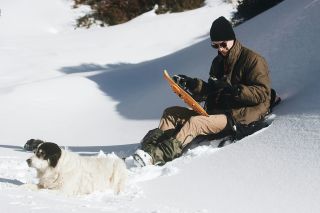
We all crave a sense of adventure and challenge especially those in addiction recovery. For addicts, the dopamine withdrawal from whatever drug of choice will leave them in a state of deprivation unless they can find other activities to give them a new sense of meaning and purpose.
That’s why it’s essential for clients to find new hobbies and interests that can take their minds and bodies off their past drug of choice. To aid in this, I have offered clients the choice from the mild to more extreme options. The most basic is having clients take a short walk with me outside on the streets or in the woods to complement their therapy. Others prefer more adventurous means to process their feelings, and, thus, I give them the choice to do things I’ve enjoyed from motorcycling in the summer to winter sports in the winter like skiing or snowboarding.
But even clients with no addiction struggles can benefit from the soul’s call to adventure and the outdoors. When skiing first became popular in the United States, it was to offer a refuge for those living in the city to get away from the everyday concerns of life. To this day, even with the pull to be constantly connected electronically, there’s an even greater desire to find solitude amidst the outdoors.
Clients who have rarely been to the mountains in the winter learn to connect to the tranquility and simplicity of seeing snow falling. At a ski resort, you’ll also hear the childlike screams of laughter coming from adults when they’re gliding down the mountain. Seeing adults giddy over playing in the snow is disarming and taps into our own inner child.
Obviously, skiing or snowboarding doesn’t work for some clients, but there’s snowshoeing, which is basically walking in the snow. If mobility is still an issue, there’s also the option of just hanging out at a lodge, sipping hot chocolate or a coffee while watching the activity around us. Regardless of the choice, getting them out of their norm to breathe in the crisp, cold mountain air, the outdoors becomes a means to an end.
In 1853, American writer, naturalist, and philosopher Henry David Thoreau wrote in his journal, “All nature is doing her best each moment to make us well—she exists for no other end. Do not resist her.”

Studies have shown that being outdoors (regardless of the season) boosts our mental health. A 2010 study on green exercise showed nature’s healing properties can be further enhanced when combined with movement, which releases endorphins—stress-releasing hormones—in the brain. In just five minutes of green exercise, study participants reported improvements in self-esteem and mood, regardless of their health status, gender, or age.
I’m encouraged to hear other colleagues expanding their therapeutic services like me beyond the traditional office setting. Some go so far as to spend a week with one client to immerse them in a new holistic, healing lifestyle that incorporates not only the outdoors and exercise but also nutrition, journaling, reflection, and other daily habits to jump-start a client’s new way of living.
Clients with addictions or mental health challenges need more than talk therapy, they need guidance on a new way of living, and that’s what we as therapists should aspire to help them with.
To find a therapist, visit the Psychology Today Therapy Directory.
